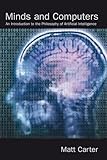Minds and Computers : An Introduction to the Philosophy of Artificial Intelligence / Matt Carter.
Material type: TextPublisher: Edinburgh : Edinburgh University Press, [2022]Copyright date: ©2007Description: 1 online resource (240 p.)Content type:
TextPublisher: Edinburgh : Edinburgh University Press, [2022]Copyright date: ©2007Description: 1 online resource (240 p.)Content type: - 9780748620982
- 9780748629305
- 006.31 22
- online - DeGruyter
| Item type | Current library | Call number | URL | Status | Notes | Barcode | |
|---|---|---|---|---|---|---|---|
 eBook
eBook
|
Biblioteca "Angelicum" Pont. Univ. S.Tommaso d'Aquino Nuvola online | online - DeGruyter (Browse shelf(Opens below)) | Online access | Not for loan (Accesso limitato) | Accesso per gli utenti autorizzati / Access for authorized users | (dgr)9780748629305 |
Frontmatter -- CONTENTS -- Acknowledgements -- 1 Introduction -- 2 Dualism -- 3 Behaviourism -- 4 Neuroanatomy -- 5 Australian Materialism -- 6 Functionalism -- 7 Formal Systems -- 8 Computability -- 9 Universal Machines -- 10 Computationalism -- 11 Search -- 12 Games -- 13 Machine Reasoning -- 14 Machines and Language -- 15 Human Reasoning -- 16 Human Language -- 17 Meaning -- 18 Representation -- 19 Artificial Neural Networks -- 20 Minds and Computers -- Appendix I: Suggestions for Further Reading -- Appendix II: Glossary of Terms -- Index
restricted access online access with authorization star
http://purl.org/coar/access_right/c_16ec
Could a computer have a mind? What kind of machine would this be? Exactly what do we mean by ‘mind’ anyway?The notion of the ‘intelligent’ machine, whilst continuing to feature in numerous entertaining and frightening fictions, has also been the focus of a serious and dedicated research tradition. Reflecting on these fictions, and on the research tradition that pursues ‘Artificial Intelligence’, raises a number of vexing philosophical issues. Minds and Computers introduces readers to these issues by offering an engaging, coherent, and highly approachable interdisciplinary introduction to the Philosophy of Artificial Intelligence.Readers are presented with introductory material from each of the disciplines which constitute Cognitive Science: Philosophy, Neuroscience, Psychology, Computer Science, and Linguistics. Throughout, readers are encouraged to consider the implications of this disparate and wide-ranging material for the possibility of developing machines with minds. And they can expect to develop a foundation for philosophically responsible engagement with A.I., a sound understanding of Philosophy of Mind and of computational theory, and a good feel for cross-disciplinary analysis.Features:*A solid foundation in the Philosophy of Mind*A broadly interdisciplinary purview*A directed philosophical focus*A clear and accessible explanation of technical material with abundant exercises*A glossary of terms
Mode of access: Internet via World Wide Web.
In English.
Description based on online resource; title from PDF title page (publisher's Web site, viewed 29. Jun 2022)


